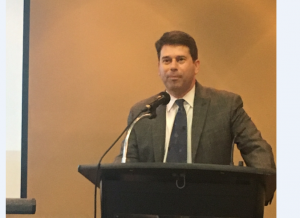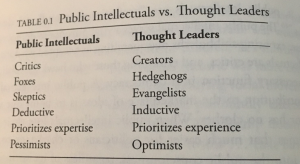I had the privilege last night of seeing Dan Drezner give the inaugural Barton Lecture at Carleton’s Norman Paterson School of International Affairs in Ottawa. His lecture was a condensed version of the argument of his book The Ideas Industry, and while I’ve read the book, the talk was useful. It’s often interesting to see people give book talks, since you get a better sense of what they think their book is about.
Drezner begins with a paradox: Everyone laments the decline of the public intellectual in our civic discourse, and yet, via outlets such as TED and related Big Ideas type lecture series’, the demand for ideas has never been greater. Drezner squares this by distinguishing two types of ideas industry labourer: Public Intellectuals and Thought Leaders. They break down as follows:
What Drezner argues, in a nutshell, is that public intellectuals have been largely eclipsed by thought leaders, so that people like Niall Ferguson and Fareed Zakaria now dominate. What has brought about this tipping of the scales is the confluence of three trends: Decline of trust in institutions, increasing polarization of the electorate, and growing inequality. These three trends have reduced trust in general experts, and created lucrative, privately-funded markets for what is often heavily partisan “thought leadership.”
And this is bad, Drezner says, because a healthy civic space needs a good balance between both types. Thought Leaders for sure, but also Public Intellectuals to call bullshit on the charlatans. Ted Talks yes, but also Ted Talks with critical discussants.
That’s very potted account, and you should read the book. But since I’ve written on the subject of public intellectuals in the past, and still find the subject of considerable interest, I found the talk helpful in a few ways.
First, it helped explain the outsized influence of economics in the new ideas industry. It’s something I flagged in my LRC piece from a few years ago on the subject: The gang of Twitter-academics who first disrupted the old Golden Rolodex of the Canadian punditocracy was largely composed of economists, e.g. Stephen Gordon, Andrew Leach, Kevin Milligan, Mike Moffatt, and a few others.
Drezner argues that a big reason for this is that economics has a fairly unified disciplinary normative project, underwritten by Adam Smith’s invisible hand metaphor. He talks about what he calls the “Thanksgiving test”, which is: In an argument at Thanksgiving dinner, who does the table defer to? On medical questions, they’ll defer to the doctor. On legal questions, to a lawyer. On public policy/economic issues, they’ll defer to an economist — but not to a political scientist. People will happily argue and disagree with a political scientist.
I think this is right, and it pretty much accounts for the growing dominance of economics in the ideas industry here in Canada. To see the extent to which this is the case, simply note that the group of Twitter-based #cdnpoli types who see themselves as supporting “evidence based policy” call themselves “The Economist Party”.
Second: I think Drezner underestimates the role the decline of the mass media has had in tipping the balance towards thought leadership and away from public intellectuals. (Although his response is that the decline is not nearly as pronounced in the US as it is here). If you look at that chart above, about the contrasting dispositions of the two types, it is clear that there is a great deal of affinity between public intellectuals and journalists. Journalists are basically skeptical, cynical, pessimistic foxes. Hence, I would argue that there was always a great concordance of interest between the two: journalists were more likely to reach out to public intellectuals for comment or input on a story, and far more likely to look to expose the charlatan nature of thought leaders.
The decline of the mainstream media has created a vacuum, to the point where there is no easy place for the classic public intellectual to make a contribution, brokered by the authority of the mainstream press. That’s not always a bad thing, as I argued in my LRC piece. But the obvious replacement venue, social media, has become hostile to public intellectualism precisely because of Drezner’s Thanksgiving test. The thoughtful generalist gets drowned out by the poor noise:signal ration of social media, while Twitter in particular is a forum tailor made for the hedgehog-like clarity of the thought leader.
Finally, I was struck by the extent to which non-fiction publishing itself is now driven by the need to serve the thought leadership industry. Over dinner after Drezner’s talk, I was chatting with a well-known Canadian public intellectual who told me that recently had a book pitch turned down, not by his publisher but by his speaker’s bureau, who told him that no one wanted to hear a talk about that subject. What he needed was book pitch better suited to the speaking circuit.
Which is too bad, because the book idea he had that was turned down sounded really cool.



Thanks for posting your thoughts and the shout-out to the econos—but some days when I see my inbox and my twitter @’s I’m really not sure we econos get the deference you think we do….
Ha. Better tell Drezner that.
I’m puzzled by the “well-known Cdn public intellectual” anecdote you end with above (wish I’d heard it live last night). Assuming that his publisher thought the book pitch idea was appealing enough to sell books, how could it not be appealing enough to draw event bookings and audiences? Or did he junk it based on the speaker bureau reaction before going to the publisher? Is this the new normal out there in the Cdn public intellectual-sphere?
The CBC’s This is That program has been doing an excellent job lambasting the rise of the thought leader in this video: https://youtu.be/_ZBKX-6Gz6A
And this new, *hilarious* satirical podcast for those of us the ideas/tech/entrepreneurship space: http://www.slate.com/articles/podcasts/gist/2017/10/peter_oldring_on_his_podcast_dexter_guff_is_smarter_than_you.html